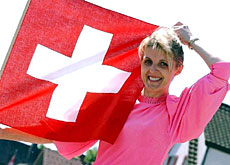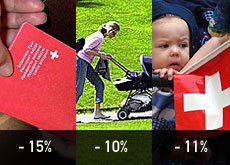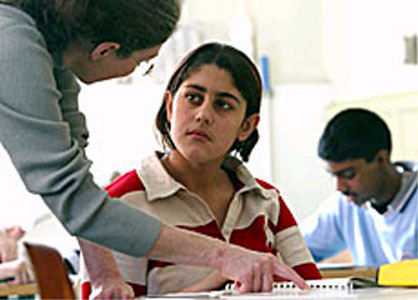Voters to decide who should be Swiss

Swiss citizens are to decide whether to make it easier for young foreigners to gain a red passport, in a nationwide ballot on September 26.
The rightwing Swiss People’s Party opposes proposals, approved by parliament, aimed at easing restrictions for foreigners who meet certain conditions.
The debate in the run-up to the nationwide vote has focused on the integration of young foreigners in Switzerland and the government’s immigration policy.
However, the issue of whether citizenship applications should be decided in secret ballots, by local parliaments or special committees, is not part of the latest ballot.
“The citizenship procedure in Switzerland is complex and can be costly for applicants. Young foreigners in particular feel they are being discriminated against,” the government said in its official booklet published ahead of the vote.
Jeremias Blaser, a political analyst at Fribourg University, said the government was trying to bring its citizenship policy into line with other European countries.
Lots of foreigners
“[By doing so] the authorities are hoping to change the debate about immigration because the relatively high percentage of foreigners is set to drop if the vote goes through.”
Foreigners currently make up 20.5 per cent of permanent residents in Switzerland. This figure is likely to decrease by about four per cent by 2025, according to Avenir Suisse, a think tank of the Swiss business community.
Blaser added that political parties have a vested interest in the issue since the easing citizenship would significantly increase the number of potential voters.
Born and bred
Under the proposal, foreigners aged 14 to 24 who have attended school in Switzerland for at least five years and meet certain other conditions would be eligible for a simplified citizenship procedure.
Children born in Switzerland to foreign parents who went to school in Switzerland and meet certain other criteria would automatically qualify for citizenship.
In addition, the government and parliament want to standardise the regular citizenship procedure by reducing the period of residency required to apply and setting unified administrative fees.
Officials estimate that the number of naturalisations will temporarily increase by 40 per cent to 52,000 from 37,000 per year at present, if the proposals are accepted. However, the figures are expected to drop significantly in the medium term.
Under Swiss law, federal, local and regional authorities are involved in the citizenship procedure. And many of the country’s 26 cantons have their own special rules.
Integration
The government, parliament and three of the main political parties are in favour of easing citizenship.
Vreni Hubmann, a parliamentarian for the centre-left Social Democrats, highlights the importance of integrating young foreigners: “It is only fair to give full political rights to people who have been brought up here… and paid taxes.”
The rightwing Swiss People’s Party argues that citizenship is something that should be earned, not given away. “It should not be made too easy for foreigners,” said parliamentarian Hans Fehr, who is also a leading member of the isolationist group, Campaign for Independent and Neutral Switzerland (CINS).
The Swiss business community has noticeably steered clear of any major involvement in the vote campaign.
“The ballot has no impact on labour market. It is not the passport of an employee that is of key importance, but his or her qualifications,” said Roberto Colonnello of the Swiss Business Federation, economiesuisse.
He added that the bilateral treaties with the European Union on the free movement of people removed the biggest obstacles for the Swiss economy.
From no to yes
Political analyst Jeremias Blaser suspects the business community is also pandering to the People’s Party, and he warns that Switzerland’s image abroad could take another dent if the vote were to be rejected at the ballot box.
“Foreigners and asylum policy have long been the core business of the People’s Party,” he told swissinfo. “But I’m not so sure about their view of Switzerland as a special country whose passports are particularly sought after.”
The latest opinion poll found nearly two out of three people interviewed came out in favour of easing citizenship rules for third-generation foreigners, while 53 per cent approved of new regulations for second-generation foreigners.
Opposition appears to have increased over the past few weeks with 29 and 37 per cent respectively saying they would vote against the proposals.
Similar plans to ease citizenship rules have been rejected twice before by the Swiss electorate. In 1994 a majority of voters came out in favour, but the proposed changes failed to get a majority of cantons, which is necessary for any proposal that would change the constitution.
The number of so-called second- and third-generation foreigners, mainly descendants of immigrants from Italy, Turkey, Spain, Portugal and the Balkans, has increased significantly in Switzerland over the past two decades.
swissinfo, Urs Geiser
Permanent residents in Switzerland numbered 7,383,000 in March 2004.
Foreigners numbered 1,518,600 (or 20.5%), of which 116,970 are second-generation.
About 18,000 babies are born to foreign parents in Switzerland every year.
An average of 37,000 people are naturalised every year.
Voters go to the polls on September 26 to decide whether to ease citizenship restrictions.
The new rules are aimed at making it easier for foreigners aged 14 to 24, who went to school in Switzerland, to get a Swiss passport.
Children born to foreign parents in Switzerland could automatically get Swiss citizenship under certain conditions.
In addition the regular citizenship procedure is to be standardised.
The rightwing Swiss People’s Party opposes the plans.

In compliance with the JTI standards
More: SWI swissinfo.ch certified by the Journalism Trust Initiative
















You can find an overview of ongoing debates with our journalists here . Please join us!
If you want to start a conversation about a topic raised in this article or want to report factual errors, email us at english@swissinfo.ch.